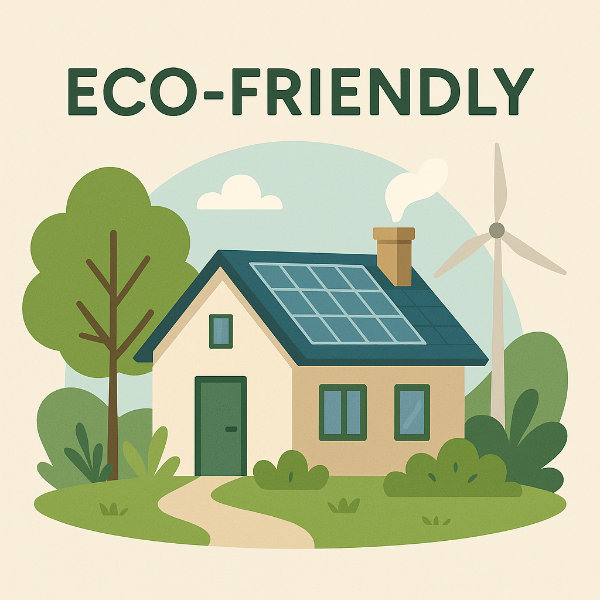Eco-Friendly Property Investments in the UK: Benefits and Tax Incentives
With the increasing urgency to address climate change and the UK's commitment to achieving net-zero carbon emissions by 2050, eco-friendly property investments have captured the attention of developers and investors alike. This comprehensive exploration delves into the manifold benefits, financial incentives, and tax advantages of investing in eco-friendly properties in the UK, while addressing current challenges and providing a roadmap for potential investors.
Understanding Eco-Friendly Property Investments
Eco-friendly properties are designed to minimise environmental impact, incorporating sustainable practices and materials. These properties often include renewable energy sources, energy-efficient designs, and smart technology, reducing the carbon footprint and contributing to a sustainable future. This aligns with the UK's environmental targets, making such investments both progressive and prudent.
Common eco-friendly features include solar panels, wind turbines, green roofs, advanced insulation, and smart home technologies for optimised energy use. The rising demand is driven by environmental consciousness, regulatory frameworks, and the financial benefits eco-friendly properties offer.

Environmental Benefits
- Reduction in Carbon Emissions: According to a study by the Energy Saving Trust, properties fitted with solar panels can reduce carbon emissions by up to 40%, contributing significantly to climate goals.
- Resource Conservation: Implementing technologies like rainwater harvesting can reduce a property's water consumption by up to 40%, as supported by the UK’s Waterwise data.
- Cost-Effectiveness: Potential to purchase below market rates.
- Biodiversity Preservations: A report by the University of Exeter highlights that green spaces, including gardens and green roofs, can reduce stress levels by around 10%, benefiting both human health and urban biodiversity.
- Energy Efficiency: According to the UK Green Building Council, eco-friendly homes conserve energy effectively, reducing consumption by up to 30% compared to traditional homes, thus decreasing fossil fuel dependency.
Financial Benefits
- Lower Operating Costs: The Energy Savings Trust estimates that energy-efficient homes can save up to £250 annually on bills, providing economic relief and enhancing affordability.
- Increased Property Value: Recent data from the Royal Institution of Chartered Surveyors (RICS) suggests that energy-efficient homes can command a premium of 5-10% over traditional properties.
- Higher Rental Yields: A report by the British Property Federation found that green-certified buildings enjoy a 10-15% premium on rental incomes, driven by tenant demand for sustainable living solutions.
- Regulatory Compliance: Eco-friendly homes often pre-emptively meet emerging regulatory standards, such as the Energy Performance Certificate (EPC) requirements, safeguarding against future compliance costs
Tax Incentives and Government Support
Several government schemes and incentives are designed to foster eco-friendly property development, alleviating upfront costs and facilitating market growth:
- Reduced VAT Rates: The UK government maintains a reduced VAT rate of 5% on energy-saving materials and installation, which applies to solar panels, insulation, and certain heating systems.
- Enhanced Capital Allowances (ECA): Businesses can claim 100% first-year tax relief on qualifying capital expenditures aimed at energy efficiency, as listed on the Energy Technology List (ETL), which is frequently updated to include new innovations.
- Renewable Heat Incentive (RHI): Active through March 2022, the RHI continues to offer subsidies to offset costs associated with renewable heating solutions, promoting technologies like biomass boilers.
- Smart Export Guarantee (SEG) and Contracts for Difference (CfD): The SEG enables property owners who produce excess renewable energy to benefit financially by exporting it back to the grid. Meanwhile, the CfD program supports large-scale renewable projects through guaranteed payments for energy production.
- Local Authority Support: Programs such as the Greater London Authority's Retrofit Accelerator and Bristol’s Home Energy Upgrade Scheme offer grants and low-interest loans to support eco-friendly property developments.
Challenges and Considerations
Investment in eco-friendly properties, while advantageous, involves managing common obstacles:
- High Initial Costs: Though prices are falling with technological advances, the initial expenditure for sustainable development remains a hurdle. Strategic planning and leveraging financial incentives can mitigate these costs.
- Regulatory Landscape: Navigating the intricacies of energy efficiency standards and local building codes demands careful attention. Staying informed with evolving policies such as the Future Homes Standard is crucial for compliance.
- Technical Expertise: Projects like the Lancaster Cohousing Project demonstrate the importance of collaborations with seasoned eco-builders to navigate construction complexities, maximising project success.
- Market Perception: While urban markets are increasingly receptive, perceptions vary. A Savills survey highlighted that over 60% of millennial renters prioritise energy efficiency, reflecting a shift towards sustainable preferences.
